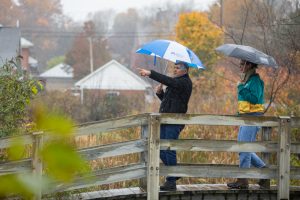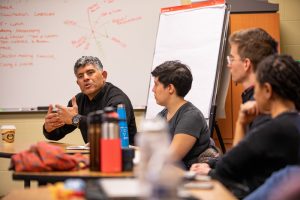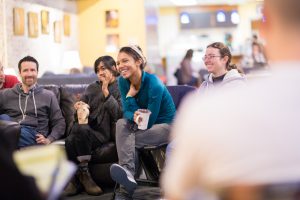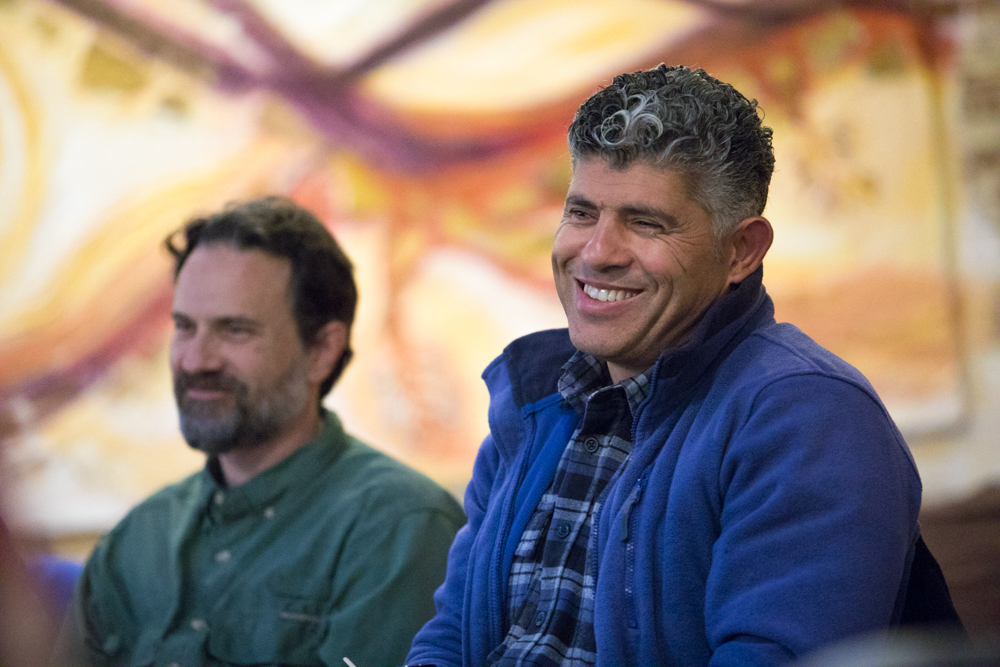Since 1998, undergraduate, graduate and alumni groups from Eastern Mennonite University and Eastern Mennonite Seminary have made the Tent of Nations farm outside of Bethlehem a regular stop on their Middle East trips. Several hundred have visited the Nassar family’s 100 acres in Palestine to plant trees, harvest olives and fruit, and learn about the family’s witness to peace through non-violent action. Workshops, seminars and camps are also offered to between 5-7,000 visitors annually from around the world.

In those 20 years, one family member, Bshara Nassar, attended and graduated from the Center for Justice and Peacebuilding. (Bshara, married to Kiersten Rossetto Nassar ‘13, is a founder of The Museum of the Palestinian People in Washington D.C.)
But his uncle, Daoud Nassar, who directs farm operations and is the lead spokesperson for Tent of Nations, had never visited EMU.
That changed the first week of November when Nassar spent two days on campus, participating in several interactions: a seminary chapel sermon, a lunch discussion with present and future Middle East cross-cultural participants, a classroom discussion with students at the Center for Justice and Peacebuilding, and an evening forum and discussion open to the community. Nassar’s time on campus concluded with a student-led tour of EMU’s sustainability efforts, a request he specifically made to gain more ideas for his own family farm in Palestine.
Among many familiar faces on campus to greet Nassar was Timothy Seidel, director of EMU’s Center for Interfaith Engagement (CIE) and assistant professor of international development. While living in Bethlehem and working for Mennonite Central Committee from 2004-07, Seidel visited the farm on a number of occasions and saw the family regularly at Christmas Lutheran Church. More recently, he interviewed family members during his doctoral research into nonviolence and civil resistance in Palestine.
Nassar’s visit was sponsored by CIE, Eastern Mennonite Seminary, and the Center for Justice and Peacebuilding.
‘Who Is My Neighbor?’
Emeritus Professor Dorothy Jean Weaver introduced Nassar to the seminary audience, delighted to finally be able to reciprocate the hospitality and love the family had shown to her and her students over more than 10 visits to Palestine since the 1990s.
“Their ongoing friendship has blessed my life,” Weaver said. “And like me, I would venture that many of our seminary students who have visited Tent of Nations would say their experience was uplifting and inspiring, seeing how the Nassar family has endured their situation with a deeply hopeful approach to life and so guided by Christian principles.’”

The Nassar family lives on land that they have owned for generations, yet nevertheless has been in continuous litigation with the Israeli government since 1991. Their choice of family motto — “We refuse to be enemies” — was deeply intentional and has strong links to the scripture text about the Good Samaritan, he explained during the seminary chapel service.
“The good Samaritan did not raise the question what would happen to me if I stop? He asked what would happen to that man if I don’t stop?,” Nassar said. “This is the true meaning of love which is action, to see and act in a different way … Acting differently, that is what Jesus meant by loving your neighbor. When you act in a different way, you open a new perspective for someone else to see the other differently.”
Acting with violence toward their oppressors would not change their situation, Nassar said, recounting the family discussions that led to the eventual establishment of Tent of Nations. “We decided there must be another way of resistance, to resist with love, because we believe that hatred creates more hatred, darkness more darkness.”
Spiritual experiences and more
Bill Goldberg, director of CJP’s Summer Peacebuilding Institute, spent a memorable week at Tent of Nations while co-leading the fall 2017 cross-cultural with his wife Lisa Schirch, son Levi and daughter Miranda.

The days were simple, rich and full, he remembered, with hours of labor helping with the olive harvest followed by meals and fellowship around a fire at night. While the nights were dark, peaceful and still, the hum of construction and the sight of electricity in nearby Israeli settlements, as well as the main road blockade set by Israeli soldiers, was a constant threatening reminder of the situation in Palestine.
Reconnecting with Nassar on campus brought back strong recollections for Goldberg of the site of his “most profound spiritual experience.” Palestinian guide Alaa Hamdan MA ‘08 (the group also had an Israeli guide) had said that the Muslim call to prayer is “constant, circling the globe continuously, starting a few seconds to a few minutes later in each village as the earth rotates.
On a hilltop at Tent of Nations one evening, Goldberg says he thought the call was merely echoing off the hills. “But then, in succession, it stopped in each village. I was actually hearing the call to prayer travel around the world. It was beautiful and uplifts my heart now just to think about it.”
At the reunion, students shared reflections of their own experiences at the farm. “Daoud talked about the land and updated us on the complex legal situation,” Goldberg said. “While we were there, the family was rushing to refile paperwork to keep their land ownership case in the Israeli court system, a cycle that has sadly become as much a part of their calendar as the olive and fruit harvests. So that was something we wanted to know about.”
“He also talked about volunteers helping at the farm,” Goldberg added, “and of course, tried to recruit a few to come back.”
Future Middle East travel
- EMU’s connection to the Middle East expanded last year with the first Alumni and Friends Cross-Cultural to the Middle East with longtime and much beloved leaders Linford and Janet Stutzman. Read more here.
- Check out the Alumni and Friends Cross Cultural webpage for more information on other travels, including the next Middle East trip with the Stutzmans in fall 2019.
- Seminary professors Dorothy Jean Weaver and Kevin Clark co-lead a Middle East cross-cultural for seminary students in summer 2019.
- The next Middle East cross cultural for EMU undergraduate students travels with the Stutzmans in spring 2019.

Friends of Tent of Nations North America sends greetings to all whom we met on the recent tour to EMU and our voice of appreciation for your support of TON/Nassar family all these years with your visits to the land. In gratitude, BiLL
Bill Plitt
Executive Director/ Co-founder
Friends of Tent of Nations North America.
So pleased Daoud got to visit! Wonderful historical and educational! Keep up the strong links. The Tent of Nations needs international support!